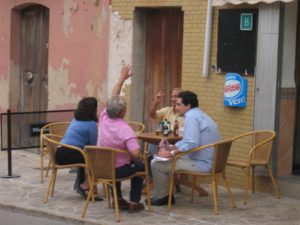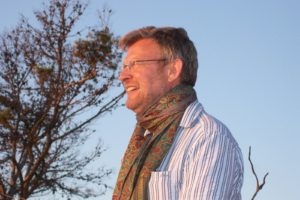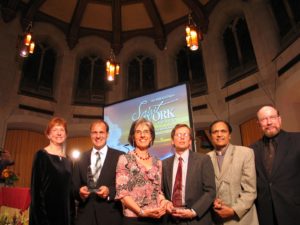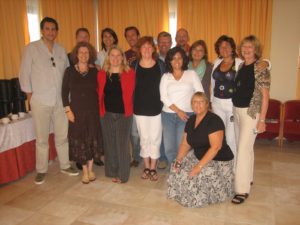 Peter and Kirsten Mikkelsen Pruzan, together with Debra and William Miller, wrote a wonderful book titled “Leading With Wisdom: Spiritual-based Leadership in Business” (Greenleaf 2007). Peter is Professor Emeritus at the Department of Management, Politics and Philosophy, at the Copenhagen Business School in Denmark, and his wife Kirsten is an eminent journalist and former newspaper editor at Berlingske Tidende, a major daily newspaper in Denmark. Along with Debra and William Miller, Peter and Kirsten are devotees of Sai Baba, and deeply committed to their personal spiritual paths, as well as to helping organizations become more enlightened.
Peter and Kirsten Mikkelsen Pruzan, together with Debra and William Miller, wrote a wonderful book titled “Leading With Wisdom: Spiritual-based Leadership in Business” (Greenleaf 2007). Peter is Professor Emeritus at the Department of Management, Politics and Philosophy, at the Copenhagen Business School in Denmark, and his wife Kirsten is an eminent journalist and former newspaper editor at Berlingske Tidende, a major daily newspaper in Denmark. Along with Debra and William Miller, Peter and Kirsten are devotees of Sai Baba, and deeply committed to their personal spiritual paths, as well as to helping organizations become more enlightened.

Peter, Kirsten, William and Debra are all Edgewalkers in every sense of the word. They have all spent considerable time in India, and William and Debra now live there fulltime. They have had meaningful experiences in more than one culture, and see themselves as global spiritual citizens. They have all had successful mainstream professional careers, and while deeply committed to their spiritual paths, feel very strongly called to be in the world and to make a difference in business.
With the term “Edgewalker,” Judi Neal has captured the essence of the challenge that many people I know (including myself!) regularly face: how best to straddle the realms of our spiritual and more mundane worlds? To mention just one such group of Edgewalkers, I have had the privilege over the years of knowing highly respected business leaders who seek “success” both in their organizational-leadership role, where they are responsible for the performance of a corporation, and in their self-leadership role, where they are solely responsible to their true selves. Many such leaders have shared with me the excitement that results from balancing success in both of these worlds – the so-called ‘real world’ we live in, and that world which transcends this world of people and companies and cities and mountains and artifacts and …, but which they know from their own experience is their ‘really real’ world.
A more nuanced picture is provided by referring to two types of Edgewalkers I know: those who know they are Edgewalkers, and those who do not know they are – or who are not willing to or are afraid to accept that they are Edgewalkers. This latter group includes a number of my wife Kirsten’s and my dear friends from Denmark, where the culture does not promote a spiritual approach to life.
Personally, no matter where I am, whom I am with and what I do, I am highly aware that I am straddling these two worlds, the world within and the world without. However, the moments of greatest joy are those when this awareness vanishes and is replaced by a state where I simply am – when the ‘edge’ vanishes, when there is no separation, and all there is is love and peace. My own experience, as well as that of others I know, indicates that while this state of ‘edge-erasing’ is a gift that cannot be ordered, it is somehow a result of conscientiously ‘edge-walking’.
I love the distinction that Peter makes about the “real world” and the “really real” world. If you are interested in learning more about corporate leaders who straddle the “real world” and the “really real” world, I highly recommend their book “Leading With Wisdom.” This book is based on interviews with leaders all over the world who, in their own words, share how they integrate their inner life and outer life.
Several months ago I had asked Peter and Kirsten if they knew of any enlightened organizations in Denmark that might qualify for the International Spirit at Work Award. Peter responded that while many leaders have a deeply spiritual approach to the way they run their organizations (see for example the interviews with Lars Koling, former CEO of Oticon and Niels Due Jensen, Group Chairman of Grundfos Management A/S in their book), a more open and public approach to spirituality is still not acceptable in Denmark. This is true in many cultures around the world, including most of Europe and China.
At the same time, just because a culture does not support a spiritual approach to life doesn’t mean that people in that culture don’t hunger for a greater sense of purpose, meaning, and connection to something higher than themselves. I spent a week in Denmark taking a meditation course with a Danish friend of mine who is part of a spiritual community near Arhus. I met people from several countries at that meditation course, and continue to be in touch with some of them. My friend, Anne Nygaard, who invited me to the course, has taught meditation in corporate settings such as the world headquarters of LEGO. Walking between worlds may not be mainstream yet, but it is just below the radar.
Finally, I want to respond to Peter’s last paragraph about when the edge between the two worlds vanishes. All spiritual and religious traditions provide paths to this non-dual, oneness experience. It is an experience available to everyone and it can come from years of spiritual discipline, from a life-threatening experience, or from a moment of grace unbidden. Wherever it comes from, or however it comes, once you have experienced this at-one-ment and allness, you never quite see “reality” the same way. You have seen what is “really real.”
Click here for more about Leading With Wisdom.
Click here for more about the Global Dharma Center.
I wonder what organizations would be like if more of our leaders spent time not only Edgewalking, but going beyond where there are edges, and operating from the wisdom that flows from that place of Oneness.
 ngton D.C., the U.K., Switzerland, German, and Spain joined us on a journey of exploring leading edges and what it takes to live to the edge of all your possibilities. We began with a cross-cultural experience where participants walked through a local Mallorquin village called Andratx (pronounced “An-dratch”). They were instructed to interact and connect with people in the village and to observe themselves as they were “walking between worlds.” As you can see from this photo at an outdoor cafe, it was a very positive experience.
ngton D.C., the U.K., Switzerland, German, and Spain joined us on a journey of exploring leading edges and what it takes to live to the edge of all your possibilities. We began with a cross-cultural experience where participants walked through a local Mallorquin village called Andratx (pronounced “An-dratch”). They were instructed to interact and connect with people in the village and to observe themselves as they were “walking between worlds.” As you can see from this photo at an outdoor cafe, it was a very positive experience. Nature is a powerful teacher, and I encourage you to take time by yourself on a regular basis to be in someplace that nurtures your soul and allows that inner monkeymind to settle down. When you let go, for a short while, of the daily to do list, and the thoughts about what you should do, and what you wished you had done, a deeper wisdom has room to rise up and be recognized.
Nature is a powerful teacher, and I encourage you to take time by yourself on a regular basis to be in someplace that nurtures your soul and allows that inner monkeymind to settle down. When you let go, for a short while, of the daily to do list, and the thoughts about what you should do, and what you wished you had done, a deeper wisdom has room to rise up and be recognized.

 By Judi Neal
By Judi Neal